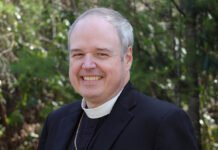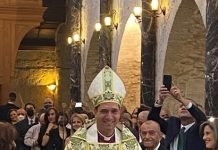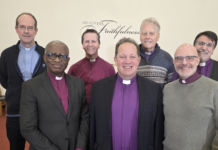A few weeks ago I was part of a meeting of leaders of different faiths from across the United Kingdom who met online to talk about the challenges and opportunities we are facing within our religious traditions and in our communities. It was a meeting of very different people, from very different backgrounds, with very different beliefs.
But I was struck enormously by the huge areas of overlap expressed. It was clear we all shared a certain loss of confidence about our communal life as we emerge from the pandemic. One person put it best when they said it was as though the pandemic had caused us all to ‘lose the muscle memory of how to be together’.
A key lesson of Covid has been unequivocally that the illusion of individualism and atomisation is just that: it’s an illusion. A fallacy. The very nature of a virus is that it is contagious or infectious – it needs many people to spread and thrive. It took that physical manifestation of connection for many of us to realise how we are connected in all sorts of other ways. From staying at home, to bulk buying supplies, to getting the vaccine, to wearing a face mask – the message was clear: our actions affect other people. We cannot do what we want without it having an impact somewhere else. Even when we stayed at home, however difficult – and however lonely – it was for many people, we did not live without an effect on others.
However, in the debate over vaccination especially, it is noticeable that individuals and groups talk extensively about their own rights, needs and wants as though still entirely autonomous.
Amongst the greatest challenges we face as communities, as a nation and as a world are the challenges of the tension between individualism and community. Global inter-generational equity, technological change, climate change, vaccine nationalism. These are all interrelated issues with a common feature – those who have, gain more and those who have not, bear the consequences. The strong do what they will, and the weak suffer what they must.
What is demanded then for a common future where all can flourish?
Know it or not it is a challenge from God who created all to answer that question. And ‘all’ means not just our immediate family, or even our next door neighbour, or the people who live in our town, city or country – but globally. We have to learn to care about those people we may never meet and might never know as though they were among our visible neighbours. As we face the pandemic, as we look at the threat of climate change, we are standing before issues that affect every single one of us across the globe, no matter where we live and who we are. We are being called to look at the world as one, rather than through the lens of narrow nationalism, factionalism, politics, economic union or self-selecting group. We face the call to see every single person with whom we share this world no longer as a stranger, a foreigner, an alien: but as a neighbour. God’s answer to the question “Am I my sister or brothers’ keeper?” comes back unequivocally: “Yes. Yes you are, and your sisters and brothers are found in every community on the planet. In their flourishing is also your own. In their decline is also your judgement”.
The challenges of our time go to the heart of understanding what it means to love our neighbour.
For many, richer countries the philosophical, moral and above all spiritual loss of even a notional underpinning of what it means to be a society leaves us without the means of navigating the huge changes of the near future. That is the loss that results in radical individualism and autonomy, while we forget the lessons of the last few years that stare us right in the face: almost nothing we do fails to affect other people.
Some things we do in fact affect other people more than they affect us – mask wearing for instance – that’s why we have all made so many sacrifices over the last few years.
But there is nothing in heaven or on earth that exists in total isolation. God Himself, the triune God, is a God of dynamic relationship.
The result is that in our national life, there are two areas in which we miss out when we become autonomous and individualistic. The first is responsibility. The second is truth.
In John 14:6, Jesus declares ‘I am the way, the truth and the life.’ Too often Pilate’s mistake is made, asking ‘what’ is truth, when we should be asking ‘who’ is truth. In David Ford’s recently published commentary on John, he repeats again and again that in looking at Jesus we see the truth about the triune God, about ourselves and about the world and its creation.
The truth in Jesus Christ is that it’s not principally communicated in dogmatic statements. Truth is relational and personal. Truth is a ‘who’ that relates to us and reveals the truth to us.
Truth is found in the pattern of the life and indwelling presence of the Christ who remains, dwells, pitches his tent with us. The first question the disciples ask of Jesus is not “what are you?”, but “where are you abiding?” Where are you staying? Where do you remain? That is a question of personal relationship – with Christ and with each other.
Recently I have had the opportunity to talk to some fascinating people as part of a series of interviews for the BBC. Rather unusually, on this occasion I was the one doing the interviewing. One of them was Elif Shafak, the Turkish writer and political activist. She spoke so movingly about seeing people – truly seeing them for who they are, not judging them for who we think they are or who we want them to be.
She talked about our tendency to put people in boxes, to separate out and label people, to reduce them to one word which is based on our judgement. Yet, by contrast, how intimately God knows each of us! Below the surface we present to the world he sees the rich inner life we all live with, and he calls us to see others, in all their nuance, their story, fully too.
In her novels, Elif writes about people who have known conflict and trauma, who have inherited intergenerational memories of pain and loss. She writes about people whose histories and present life have been defined by an ‘enemy’. And, crucially, she writes from the different perspectives of the characters, getting inside their skin to understand them, see them and know them.
In Jesus, God becomes fully human. He lives with us, dies for us, but most of all, he loves us in holiness and grace, justice and mercy, as people, not as categories. He comes to each human being to be the way, the truth and the life.
The truth of God is to be expressed by individuals and communities of love and service. Jesus says ‘If you love me, keep my commandments’, (John 15:14). It’s a direction that is preceded by the commandment to which he refers, to imitate him and ‘wash feet’, and to ‘love one another’.
That is the context that builds the strong foundation for Jesus’ final public prayer and he prays in John 17:21 that Christians may be united for the very exact and precise purpose that the world will know the truth, that Jesus has come from the Father. When the truth is known, the life is found and the way is seen. And it’s all in the person of Jesus. That way, truth and life will transform the nature of the world, of the whole creation, and has done so throughout the centuries.
A society that forgets about God, that loses the sense that it needs God (something discussed in the second interview I did), that no longer desires God – for John’s gospel has desire at its heart – such a society loses the profound call to see the wholeness of the individual human person and the call to love, by that person being set free in relationship with others. And without the church, without that community of faith, as the salt and light of that society, that society loses its way. Without God it cannot maintain a determining objective except power. As Nietzsche shows so clearly. Jacques Maritain, the Roman Catholic philosopher, wrote during the deepest darkness of 1942;
‘…deprived of a determining objective, political communion will carry its demands to the infinite, will absorb and regiment people, swallow up in itself the religious energies of the human being. Because it is not defined by a work to be done, it will only be able to define itself by its opposition to other human groups. Therefore, it will have essential need of an enemy against whom it will build itself; it is by recognizing and hating its enemies that the political body will find its own common consciousness.’[1]
Does that not speak to us as much today as it did in 1942? From the individual events like the shocking, disturbing and utterly abysmal harassing of Keir Starmer and David Lammy yesterday, to the threats of war in Eastern Europe, to the actual wars around the world. Do we not see societies forgetting God and therefore existing by the creation of an enemy. Do we not see it in our own society, and I fear do we not see it far to often in our own church?
And so in politics our concern about truth-speaking and truth-acting is not about political groupings – or in the church – but about where we find the foundations for confidence in government, confidence in leadership and above all the confidence in one another which enables us to function as a good society which seeks the common good.
It’s through that community which seeks the common good and that sense of the common good that we gain the ability to recognise that in serving Christ we are not a church of loss and gain, factions in a zero sum struggle, but of abundance and grace. It is in showing such a way of living that society can learn that lesson when they see us living it.
Grace and wisdom call us to find our way into God’s abundance from the selfish scarcity in the world: and then to be that abundance in the world and that has been what has happened so much over the last two years, praise God. But somehow, even though we as the Church of England are a church that God has blessed so abundantly, a church with enormous gifts of people, history, schools, money, all kinds of resources, parishes, dioceses, so much! We nevertheless have convinced ourselves, have talked ourselves into a sense of impoverishment and inability to meet the issues with which God has faced us.
Again, the question is not to ask what we are, but whose we are, who we follow.
Think of the vision and strategy diagram which has right at its very heart that who we is Christ-Centred and Jesus-shaped, working along the 5 marks of mission. When our centre is Christ, Christ holds us together across all of our differences and disagreements. That’s what marks us out as Christians. It’s not that we all agree, or even that we’re good at disagreeing well much of the time, but in foot washing, in service and love, we open a way to express the steadfast love of God to each other, and so we are strengthened to be the abundant love of God in the world. That is true, God knows of the genuinely impoverished churches of the global majority world as well as the lavishly endowed ones like ourselves.
When we becomes God’s abundance, we find God’s unfathomable grace. We find forgiveness and reconciliation. In service and in love we minister and receive grace which means we are not consumed by rivalry, but we’re able, by grace alone, to set an example to the world of how we can disagree and struggle but still love.
The French philosopher Paul Ricoeur compared the human economy to the divine economy. And he said that the life of faith should not be about exchange and equivalence but abundance and grace. Living together as the church is not about ‘your gain is my loss’ or ‘my win is to your detriment’. The ‘synhod-os’, the walking together of the Church, doesn’t mean some people ‘win’ and others ‘lose’. It means Christ died for every one of us and together we seek to follow where He leads and to grow together in salvation. Abundance and grace means we become a kind and a forgiving church. It’s something we have to receive, and to share, not something we deserve.
Being the Church of England, being the Anglican Communion, is about living together in community. There is no foreigner or stranger, we are one people. One Communion. Brothers and sisters together in Christ, with all our failings.
On the agenda for this Synod are many different items. We will discuss racial justice, safeguarding, governance. All of these many and difficult issues are of vital importance to the church and even to the wider world, and all of them are really about how to live in abundance and grace: how we love one another in the light of all of our differences, how we listen to each other across divides, how we seek to bring reconciliation across barriers imposed by history, and how we face together the division, the messiness and the pain of this world.
You will hear a presentation on two resources, the Difference Course and the Pastoral Principles, both of which provide tools for a divided society, or a divided church, to disagree well.
The Pastoral Principles identify six ‘pervading evils’ – addressing ignorance, paying attention to power, casting out fear, acknowledging prejudice, speaking into silence and admitting hypocrisy – and they call us to build relationships which see and value each other as made in the image of God. Reflecting on them, we can see where and how people might be excluded and hurt, and we can make steps to make every person feel welcome and integral in Christ’s church.
Developing the reconciling habits suggested in the Difference Course can shape us to look more like God’s people. The Difference Course has been developed by the Reconciliation Team at Lambeth Palace, and piloted around the world – drawing on theology and practice from different global contexts.
Over this Synod, this series of sessions, amid all the difficult and complicated conversations we will have together, we can all remind ourselves of the habits of the Difference Course, which are rooted in scripture, seen in the life of Christ and lived in daily life. Am I present? Are we encountering people with authenticity, bringing our entire selves – with our convictions, vulnerabilities and gifts – to the conversations?
Are we curious? Do we want to hear the story that each precious person in the Synod has to tell, do we want to know them? Do we see the innate value in other people and come to discussions with humility and room to grow and learn?
And will we have the courage to reimagine? Will we allow ourselves to be renewed by the Holy Spirit? Will we dare to work towards the world God wants for us, a world where all things are made right, where relationships are restored, justice flows down like a torrent and mercy like an ever flowing stream?
Three small habits for each of us. But if we practise them now, there will be transformation. The grace of God will guide, hold and encourage us.
And at the Lambeth Conference later this year we be talking about how we walk together as God’s Church in God’s world.
We will do that as we pray like Jesus, live like Jesus, serve like Jesus, listen like Jesus and in being one, with all our disagreements, reveal Jesus to our boxed in, dragged down, conflict ridden world. And we will walk together with the God who has called us out of darkness and into his marvellous light to declare his great wonders. And we will do it with one another, until every person can stand in the light of God who sees, knows and loves each of us.
[1] Jacques Maritain, ‘ Christianity and Democracy’, Kindle page 90, original italics



